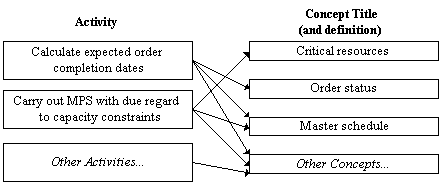Education and Training Requirements Specification for Implementation of Manufacturing Control Systems
Austen .K. Jones & A.K. Kochhar
University of Manchester Institute of Science & Technology (UMIST)
Mike Hollwey
Manufacturing Products & Services Ltd (MAPS)
Abstract
Research over the years has highlighted that many of the problems associated with MRP / MRP II / ERP manufacturing control system (MCS) implementation are personnel-related. A major issue is the education and training of personnel. An important stage in the processes of education and training is that of analysing the respective needs of personnel.
This paper describes the results of a survey, and an associated series of interviews, with manufacturing control system / MRP II / ERP suppliers and consultants. The results show that only a quarter of the participants adopted any structured approach for identifying the education and training requirements of personnel. The paper concludes with an outline of a structured approach for effectively specifying the education requirements of personnel associated with MRP II systems.
Keywords
ERP, MRP II, Manufacturing Control Systems, Education and Training, Needs Analysis.
1 INTRODUCTION
An appropriate and effectively run manufacturing control / MRP II / ERP system is a pre-requisite for the effective management of most manufacturing organisations (Muhlemann et al 1992). Despite the importance of such systems many implementations fail and many systems are operated at far from their full potential of effectively supporting company goals (Brown 1994, Burns et al 1990).
Much research has been undertaken in an attempt to determine the root causes of implementation failures. One of a group of commonly recurring factors highlighted is the education and training of staff (Duchessi et al 1989, Udo & Ehie 1996). Education and Training, as processes, comprise of a variety of issues. These issues include the timing of the education / training, delivery of the education and training courses, and the specification of the education and training requirements of staff (Wallace 1985, White 1980). Figure 1 indicates the important role that needs specification plays in the process of education / training (Kenney & Reid 1988).

Figure 1 The Education / Training Cycle
This paper focuses on the issue of staff education and training needs analysis and the use of any structured methodologies in industry. This issue is important for a range of reasons. Ensuring personnel do not attend courses that they do not need to helps to reduce boredom and wasting the person's time and the company's money (Boydell & Leary 1996, Parry 1991). Conversely, ensuring that individuals attend the courses that are relevant to their needs means that they are more likely to facilitate the change / implementation process as they understand why the change is necessary and their role in it (Kinnie & Staughton 1993). In the context of training, ensuring correct course attendance means that there is less likelihood of data accuracy problems and procedural inefficiencies (Brown 1994, Herbert & Doverspike 1990).
Failing to undertake education / training needs assessments not only results in the previously described problems, it also sends out a number of important messages which are damaging to the prospects for implementation success, for instance:
· Managerial commitment to the implementation is low (Kneppelt 1981).
· Management competency is not what it should be, in that inadequate planning and forethought is given to an important aspect of the implementation project.
· The implementation is about the computerised system - not about the people who will make it work, i.e. hardware / software requirements are assessed yet education / training requirements are not (White 1980).
Further, by undertaking education and training needs assessments, and hence understanding the nature and size of the respective tasks, the associated costs can be properly and formally estimated and therefore budgeted for.
2 INDUSTRIAL USE OF STRUCTURED METHODOLOGIES
In order to assess the current use of structured approaches to identify the education and training, a postal survey was undertaken. The aims of the survey were to:
1. evaluate the perceived importance of education and training to the successful implementation of MCS.
2. determine the prevalence of structured approaches to specifying the education and training needs of staff in client organisations.
3. determine if there was any confusion between the terms "education" and "training" and whether respondents pay more attention to one or the other.
A questionnaire that elicited free-form responses was constructed and mailed to 32 companies selected from either the "Directory of Consultants" listings or a "Software Suppliers Buyer's Guide". Once an appropriate contact at each company had been identified by telephone, the questionnaire was sent out. A copy of the questionnaire was faxed to companies that had not returned the questionnaire within one month of it having been posted to them. After a further fortnight, companies that had still failed to respond were chased-up by telephone. These measures helped to achieve the relatively high response rate of over 70%.
Of the 23 responses 20 had completed the questionnaire, the remaining three replied, but declined to take part in the survey. Of these 20 companies, subsequently referred to as the "participants", 8 were listed as Manufacturing Consultancies and the remaining 12 as Manufacturing Software Suppliers.
Face-to-face interviews were conducted with three senior implementation consultants from an MRP II system software supplier. These interviews were structured and explored, in greater detail, the issues raised by the questionnaire responses. The results of the survey and interviews are discussed below.
3 RESULTS & DISCUSSION
3.1 Importance of education / training to MCS implementation success
All the participants indicated that education and training were important to the successful implementation of a manufacturing control system, with the vast majority of companies, 85%, stating that education and training were mandatory for success. This result agrees with the existing literature, i.e. education and training are important to the successful implementation of manufacturing control systems (Udo & Ehie 1996, Wallace 1985, Kneppelt 1981).
3.2 Prevalence of structured approaches to specifying the education and training needs of staff in the participating companies
What is actually meant by the term "requirements specification" should first be outlined. In order to specify requirements three activities must be undertaken:
· the current level of a person's abilities, knowledge or skills should be determined / assessed
· the minimum required level of skill or knowledge for the job role being considered must be known
· the two sets of information should be compared (i.e. gap analysis) thus determining the individual's education / training requirements.
The responses, when grouped into yes / no categories, are shown in figure 2:
Figure 2 Use of Structured Methodologies?
As can be seen 75% of the companies had no methodology for specifying the education or training requirements of personnel in client organisations. The majority of organisations in this category tended to allocate courses, or standard "packages", to individuals depending on their job title / department and which system modules were being implemented.
A further interesting observation is the distribution of company types having / not having a requirements specification methodology. The manufacturing consultancies were more than twice as likely to operate a specification methodology than the manufacturing software suppliers (i.e. 37.5% compared with 16.7%). A possible reason for this difference is that consultancies, not selling systems or hardware etc., are keen to add value to their services and one way of doing this is to offer an education / training requirements specification service. The software suppliers, on the other hand, tend to focus more on selling systems rather than "peripheral" services such as assessing the education / training needs of staff.
3.3 Determination of whether there was any confusion between the terms "education" and "training" and whether respondents appeared to pay more attention to one or the other
"Education" is concerned with the teaching of generic facts whereas "training" is system specific and is concerned with how tasks are performed. Education tends to be more theoretical and conceptual while training is more practical and applied (Landis 1981).
The participants, consultants and software suppliers alike, were unanimous about the definitions of, and differences between the two terms in the context of MCS implementation. Given that participants were consistent in their perceptions of the meaning and differences between education and training, it was possible to revisit the questionnaire responses to see which, if either, of education and training was the more dominant in the responses.
Analysing the responses in this way gives an indication of how participants perceive the relative importance of education compared to training. More responses focused equally on education and training (45%) than focused on either education or on training. However, where a focus did exist, it was much more likely to be on training than on education (40% compared to 15%). The tendency to focus on training rather than on education can be explained by one of the findings from the interviews with consultants responsible for implementing MRP II systems. The interviewees indicated that managers in their client companies were much more reluctant to buy staff "education" than they were to buy "training" to the extent that some managers become very defensive if "education" was suggested since it implied that their staff were stupid.
Disaggregating the consultancy and software supplier responses, as shown in Figure 3, another interesting tendency is elicited. The majority (75%) of consultancies in the survey focused equally on education and training in their responses. However, 50% of the responses from the software suppliers focused on training with the remainder being split between equal focus on education and training and a focus on education.
This tendency could be indicative of the software suppliers' conditioned response to the negative reaction received by education as opposed to training. Alternatively, it could indicate that the software suppliers are more concerned with the manufacturing control system itself rather than the people and, hence, consider only the needs of personnel in the context of the system, i.e. training rather than (generic) education.
Figure 3 Education / Training Focus of Companies
Focusing on the doing and not the learning misses an important point that an MCS implementation is an ideal opportunity for improvement beyond the installation of the new system per se. Education encourages people to critically assess the operation of their organisations and by stifling education the formal / informal avenues available to the company to re-engineer processes are similarly restricted (Correll 1995).
4 FRAMEWORK FOR SPECIFYING STAFF EDUCATION NEEDS
To address the need for an effective approach to performing a needs analysis, a framework has been developed at UMIST for specifying the education requirements of personnel associated with manufacturing control systems. The framework focuses on education rather than training because education is generic such that the approach can be usefully applied to any standard MRP / MRP II system and is not system-specific in the way that training is.
The framework is based on the fact that people in manufacturing organisations have specific Job roles and each Job role involves carrying out a number of different Activities / functions. In order to perform a particular Activity competently, a person needs to know certain information (or Concepts) and the level of Knowledge required of those Concepts depends on the level of involvement with the Activity. These relationships are shown diagrammatically in figure 4.
By determining the Activity profiles of individuals their Required knowledge profile can be derived. The Required knowledge profile of an individual can then be compared with the Actual knowledge profile. The gaps between the profiles show the educational needs of that person. The methodology outlined above is currently being tested.

Figure 4 Framework Relating Job Role Activities To Concepts
5 CONCLUSIONS
While education and training are understood as being crucial to successful MCS implementation, most of the companies that took part in the study have no methodology for specifying education or training requirements of staff. When comparing the responses from the two groups of participants it was found that the manufacturing consultancies were more than twice as likely to have an education / training requirements specification methodology than the manufacturing software suppliers.
The study also showed that the definitions of and differences between education and training were understood by the consultants and software suppliers alike. However, the interviews revealed that managers in companies implementing manufacturing control systems tended to be defensive about suggestions regarding education of their workers whereas training of workers was more easily readily accepted.
The software suppliers tended to focus on training whereas the consultancies tended to focus on education and training equally.
6 REFERENCES
Boydell, T. & Leary, M. (1996) Identifying Training Needs. Institute of Personnel and Development, London
Brown, A. (1994) Transformational leadership in tackling change. Journal of General Management, 19. 4, 1-12.
Burns, O., Turnispeed, D., & Riggs, W. (1990) Critical success factors in manufacturing resource planning implementation. International Journal of Operations & Production Management, 11.4, 5-19.
Correll, J. (1995) Reengineering the MRP II environment: The key is successfully implementing change. IIE Solutions, 27.7, 24-27.
Duchessi, P., Schaninger, C. & Hobbs, D. (1989) Implementing a manufacturing planning and control information system. California Management Review, 31.3, 75-90.
Herbert, G. & Doverspike, D. (1990) Performance appraisal in the training needs analysis process: A review and critique. Public Personnel Management, 19.3, 253-270.
Kenney, J. & Reid, M. (1988) Training Interventions. Institute of Personnel Management, London.
Kinnie, N. & Staughton, R. (1993) Implementing manufacturing strategy: The human resource management contribution. Logistics Information Management, 6.2, 20-30
Kneppelt, L. (1981) Implementing manufacturing resource planning / difficulty of the task. Production and Inventory Management Journal, 22.2, 59-77.
Landis, G. (1981) Approaches to MRP education and training. Computers In Manufacturing. Auerbach Publishers Inc., Pennsauken.
Muhlemann, A., Oakland, J. & Lockyer, K. (1992) Productions and Operations Management. Pitman Publishing, London
Parry, J. (1991) Training needs assessment (TNA): Its place in an effective training programme. Learning Resources Journal, 7.3, 62-66.
Udo, G., & Ehie, I. (1996) Critical success factors for advanced manufacturing systems. Computers & Industrial Engineering, 31.1-2, 91-94.
Wallace, T. (1985) MRP II: Making It Happen. Oliver Wight Inc, New York
White, E. (1980) Implementing an MRP system using the Lewin-Schein theory of change. Production and Inventory Management Journal, 21.1, 1-12.
Austen Jones obtained his M.Eng (Hons) from UMIST. He is developing and testing a tool for specifying the education requirements of personnel operating MRP II systems. He has worked in industry for ICI and several vibration monitoring / maintenance engineering consultancies.
Professor A K Kochhar is Lucas Professor of Manufacturing Systems Engineering and Head of the Department of Mechanical Engineering at UMIST. His main interests are Competitive Manufacturing and the Design, Planning and Control of Manufacturing Systems. He was elected a Fellow of the Royal Academy of Engineering in 1997.
Dr Mike Hollwey is the Managing Director of Manufacturing Products & Services Ltd (MAPS). MAPS are a leading supplier of Manufacturing Control System packages. He has a BSc (Hons) in Production Engineering and a PhD in Manufacturing Systems.

4ETO:
4
Contact 4
ERP:
ERP Software Modules
ERP Business Processes
ERP Dictionary by Category
Papers & Articles:
Index of Articles
ERP Training
CIM Seminar
ERP TNA Development
ERP Education
Computerised ERP TNA
Operations Improvements
Change Management
Production Planning Systems
Supply Chain Optimisation
S&OP and SCM
SCO Software
micro SCM Implementation

